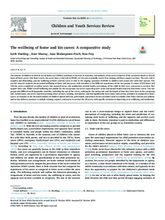Displaying 561 - 570 of 2163
Cross-sectional analysis by the Scottish Government show that the educational outcomes for looked after children are much poorer than for other children in Scotland. This presentation will discuss methods to create a longitudinal data set from these data and thus infer how a child’s lifetime history of care relates to their educational outcomes.
The article is based on interviews with 22 children’s spokespersons in the Norwegian arrangement for indirect participation in care proceedings, and presents analyses of the spokespersons’ experiences of contradictions and dilemmas in their practices.
This research examined the impact of individual and relational characteristics of foster parents on permanency outcomes for children in care.
This descriptive policy analysis examines the position of infants’ rights in the family service orientated child welfare systems of Denmark, Finland, Norway and Sweden when being placed in out-of-home care.
Children who enter out-of-home care are at risk for trauma and behavioral problems, however the child welfare and behavioral health systems do not effectively communicate to provide evidenced-based treatment. This case study describes a project that addressed these concerns.
The thesis consists of four interrelated empirical studies that address different aspects of poor educational outcomes among children with out-of-home care (OHC) experience by means of analyses of longitudinal survey and register data, and evaluations of two interventions aimed at improving their basic academic skills.
The purpose of this study was to examine factors related to unintentional child injury requiring medical attention, including child welfare placement type, child behavioral problems, caregiver characteristics, and neighborhood factors.
This chapter from the book Education in Out-of-Home Care examines as case studies the Australian media coverage of final secondary results, juxtaposed with the experiences of several care-leavers currently attending a regional university, as gleaned from in-depth interviews and enrolment data-analysis. These accounts consistently affirm an array of systemic and cultural obstacles to the successful pursuit of their education.
This Chapter from Education in Out-of-Home Care illustrates that increased resourcing is needed to facilitate the achievement of improved education outcomes for Australian primary school children in out-of-home care (OHC).
The current research explores the perceived wellbeing of foster and kin carers, with attention to the different experiences of the two groups.



